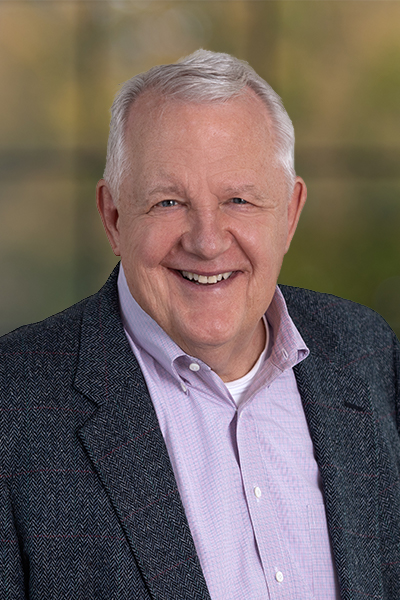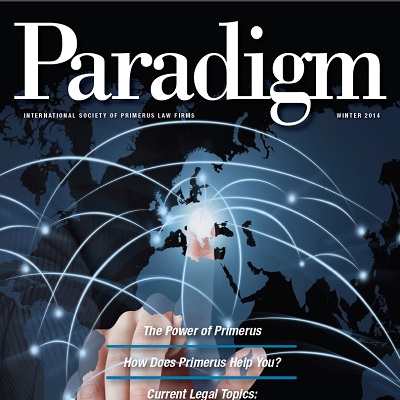Article Written By Beresford and Tingstad Appears In Paradigm Magazine, A National Publication Of Primerus
 |
 |
 |
|
| Paradigm Magazine Winter 2014 | Richard R. Beresford | David C. Tingstad |
The following article titled “The Value of a Lawyers Use of Sound Independent Judgment was written by Richard R. Beresford and David C. Tingstad of Beresford Booth for the Winter 2014 edition of Paradigm Magazine, a publication of the International Society of Primerus Law Firms. Beresford Booth is a member firm of Primerus, an international society of top-rated independent law firms.
We have all encountered the results of a poor decision made as a result of a limited perspective, lack of due diligence and just plain insufficient effort. Good lawyers bring their clients more than just a different perspective; they bring them the benefit of their detached analysis, careful questioning and sound judgment. In this article, we will discuss what separates Primerus lawyers from others: the Primerus lawyers’ use of sound independent judgment.
Most lawyers are able to inform a client about the applicable law and leave it to the client to make their own decision as to how to apply the law. We believe better lawyers add value to their clients by the use of their sound independent judgment rather than passively accepting and acting upon their client’s direction. Clients expect their lawyers to provide the benefit of their experience and judgment, discuss thoroughly the various alternatives, and, where at all appropriate, recommend a preferred course of action and strategy. This process involves hard work and discipline.
We start with “independent.” Our sound judgment must be utilized with an analysis detached from harmful emotions such as a quest for vengeance, fear of the unknown or greed. Our judgment must not be contaminated by the clients’ interpretation of their current situation. Rather, we must engage in careful questioning and investigation into the facts. We have learned that, unless we are careful, our clients tell us the “good news,” but we hear the “bad news” from the other side. Although we are advocates for our clients, we must counsel them independent of our advocacy role.
Next, we use our judgment. Judgment does not mean arrogantly believing we know better than our client, nor does it mean that we pre-empt our clients’ decision making or bias the courses of action we present to our client. It means using our experience and common sense to arrive at a sound decision. Too often, the failure to make a decision results in unfortunate consequences. Using our judgment sometimes means collectively “sticking our noses out” to get our clients to make a decision rather than passively waiting.
Finally, our independent judgment must be sound. “Sound” means the process of selecting the right course of action. The right course of action must be evaluated from a moral, as well as a strictly legal perspective. We may not be “right” every time, but we are sound in our process of arriving at our judgment for our clients. As lawyers, we should be advocates of good to our clients, which also serves a societal benefit. One of the reasons we love what we do is that we do our best every day to make our clients and our society better.
What value does a client get from our use of sound independent judgment? Plenty! From a litigation perspective, the determination of which battles to fight and how to fight them is critical. Before “starting the war,” we consider the various potential results of litigation, the probability of achieving each result, and the benefit to the client arising out of each. We question and educate the client, review the documents and strategize with the client. We attempt to get shoulder-to-shoulder with our client and then make a recommendation. Through this process, we attempt to get the client to understand their case from a different perspective and consider our recommendation. This process is time consuming and difficult, but in the end leads to cost savings and a better result. In fact, many times the client has great ideas that come about through this process, and the client gets a result far better than they could through litigation – or we are able to discover the weakness in the opposition’s position and efficiently use that weakness to achieve our clients’ objectives.
From a transactional perspective, working to evaluate the strategy associated with “big picture” issues such as the structure of a transaction or the minutiae of the “boilerplate” language of a limited liability company’s operating agreement can mean the difference between getting a deal done and the death of a company. All lawyers know how to find the risks associated with a transaction, but the better lawyers, the Primerus lawyers, add value by using their independent judgment to find solutions to the problems associated with that risk. It’s the difference between robotically filing a document with the Secretary of State and thinking through the entire scope of the transaction for the client’s overall benefit. It’s the difference between a “deal breaker” and a “deal maker.”
There are as many examples of the value added by sound independent judgment as there are clients and practice areas.
Every Primerus lawyer subscribes to the Six Pillars of Primerus: Integrity, Excellent Work Product, Reasonable Fees, Continuing Education, Civility and Community Service. We take these pillars seriously, and they inform our sound judgment with every client we represent. We use a process of detached investigation and analysis, coupled with our experience and common sense to arrive at the right course of action. This is sound independent judgment. Through the use of our sound independent judgment, we add direct value to our client and our society. The use of sound independent judgment is not a fungible commodity in today’s legal market – it is a rare find.
